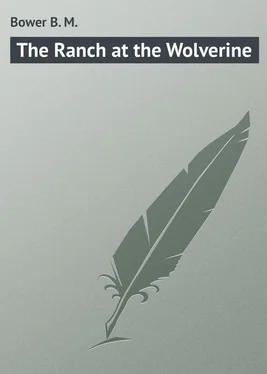B. Bower - The Ranch at the Wolverine
Здесь есть возможность читать онлайн «B. Bower - The Ranch at the Wolverine» — ознакомительный отрывок электронной книги совершенно бесплатно, а после прочтения отрывка купить полную версию. В некоторых случаях можно слушать аудио, скачать через торрент в формате fb2 и присутствует краткое содержание. Жанр: foreign_prose, foreign_adventure, на английском языке. Описание произведения, (предисловие) а так же отзывы посетителей доступны на портале библиотеки ЛибКат.
- Название:The Ranch at the Wolverine
- Автор:
- Жанр:
- Год:неизвестен
- ISBN:нет данных
- Рейтинг книги:3 / 5. Голосов: 1
-
Избранное:Добавить в избранное
- Отзывы:
-
Ваша оценка:
- 60
- 1
- 2
- 3
- 4
- 5
The Ranch at the Wolverine: краткое содержание, описание и аннотация
Предлагаем к чтению аннотацию, описание, краткое содержание или предисловие (зависит от того, что написал сам автор книги «The Ranch at the Wolverine»). Если вы не нашли необходимую информацию о книге — напишите в комментариях, мы постараемся отыскать её.
The Ranch at the Wolverine — читать онлайн ознакомительный отрывок
Ниже представлен текст книги, разбитый по страницам. Система сохранения места последней прочитанной страницы, позволяет с удобством читать онлайн бесплатно книгу «The Ranch at the Wolverine», без необходимости каждый раз заново искать на чём Вы остановились. Поставьте закладку, и сможете в любой момент перейти на страницу, на которой закончили чтение.
Интервал:
Закладка:
"Fifteen miles or so." Ward was not in his most expansive mood, chiefly for the reason that this man was a stranger, and of strangers he was inclined to fight shy.
"Oh, well – it might have been fifty. I know how you fellows measure distances out here. I'm likely to need a little coaching, now and then, if I live up to what I just now told the old lady."
"From all I know of her, you won't need to go out of the Cove for advice."
"Well, that's right, judging from the looks of things. A woman that can go up against a proposition like she did to-day and handle it alone, is no mental weakling; to say nothing of the way this ranch looks. All right, Warren; I'll make out alone, I reckon."
Afterwards, when Ward thought it over, he remembered gratefully that Charlie Fox had refrained from attempting any discussion of Billy Louise or from asking any questions even remotely personal. He knew enough about men to appreciate the tactful silences of the stranger, and when Billy Louise, on the way home, predicted that the nephew was going to be a success, Ward did not feel like qualifying the verdict.
"He's going to be a godsend to the old lady," he said. "He seems to have his sights raised to making things come easier for her from now on."
"Well, she certainly deserves it. For a college young man – the ordinary, smart young man who comes out here to astonish the natives – he's almost human. I was so afraid that Marthy'd get him out here and then discover he was a perfect nuisance. So many men are."
CHAPTER VI
A MATTER OF TWELVE MONTHS OR SO
Out in the wide spaces, where homes are but scattered oases in the general emptiness, life does not move uniformly, so far as it concerns incidents or acquaintanceships. A man or a ranch may experience complete isolation, and the unbroken monotony which sometimes accompanies it, for a month at a time. Summer work or winter storm may be the barrier temporarily raised, and life resolves itself into a succession of days and nights unbroken by outside influences. They leave their mark upon humans – these periods of isolation. For better, for worse, the man changes slowly with the months; he grows more bovine in his phlegmatic acceptance of his environment, or he becomes restless and fired with a surplus energy of ambition, or he falls to dreaming dreams; whatever angle he takes, he changes, imperceptibly perhaps, but inevitably.
Then the monotony is broken and sometimes with violence. Incident rushes in upon the heels of incident, and life becomes as tumultuous as the many moods of nature when it has a wide, open land for a playground.
That is why, perhaps, so much of western life is painted with broad strokes and raw colors. You are given the crowded action, the unleashing of emotions and temperaments that have smoldered long under the blanket of solitary living. You are shown an effect without being given the cause of that effect. You pronounce the West wild, and you never think of the long winters that bred in silence and brooding solitude those storm-periods which seem so primitively savage; of the days wherein each nature is thrown upon its own resources, with nothing to feed upon but itself and its own personal interests. And so characters change, and one wonders why.
There was Billy Louise, with her hands and her mind full of the problems her father had died still trying to solve. She did not in the least realize that she was attempting anything out of the ordinary when she took a half-developed ranch in the middle of a land almost as wild as it had been when the Indians wandered over it unmolested, a few cattle and horses and a bundle of debts to make her head swim, and set herself the problem of increasing the number of cattle and eliminating the debts, and of wresting prosperity out of a condition of picturesquely haphazard poverty. She went about it with the pathetic confidence of youth and ignorance. She rode up and down the canyons and over the higher, grassier ridges, to watch the cattle on their summer range and keep them from straying. She went with John Pringle after posts and helped him fence certain fertile slopes and hollows for winter grazing. She drove the rickety old mower through the waving grass along the creek bottom and hummed little, contented tunes while she watched the grass sway and fall evenly when the sickle shuttled through. She put on her gymnasium bloomers and drove the hay wagon, and felt only a pleasurable thrill of excitement when John Pringle inadvertently pitched an indignant rattlesnake up to her with a forkful of hay. She killed the snake with her pitchfork and pinched off the rattles, proud of their size and number.
When she sold seven fat, three-year-old steers that fall and paid a note twice renewed, managing besides to buy the winter supply of "grub" and a sewing-machine and a set of silver teaspoons for her mother, oh, but she was proud!
Ward rode down to the ranch that night, and Billy Louise showed him the note with its red stamp, oblong and imposing and slightly blurred on the "paid" side. Ward was almost as proud as she, if looks and tones went for anything, and he helped Billy Louise a good deal by telling her just how much she ought to pay for the yearlings old Johnson, over on Snake River, had for sale. Also he told her how much hay it would take to winter them – though she knew that already – and just what percentage of profit she might expect from a given number in a given period of time.
He spoke of his own work and plans, as well. He was going into cattle, also, as fast as possible, he said. In a few years the sheep would probably come in and crowd them out, but in the meantime there was money in cattle – and the more cattle, the more money. He was going to work for wages till the winter set in. He didn't know when he would see Billy Louise, he said, but he would stop on his way back.
To them that short visit was something more than an incident. It gave Ward new stuff for his dreams and new fuel for the fire of ambition. To Billy Louise it also furnished new dream material. She rode the hills and saw in fancy whole herds of cattle where now wandered scattered animals. She dreamed of the time when Ward and Charlie Fox and she would pool their interests and run a wagon of their own, and gather their stock from wide ranges. She was foolish, in that; but that is what she liked to dream.
Mentioning Charlie Fox calls to mind the fact that he was changing more than any of them. Billy Louise did not see him very often, but when she did it was with a deepening impression of his unflagging tenderness to Marthy – a tenderness that manifested itself in many little, unassuming thoughtfulnesses – and of his good-humor and his energy and several other qualities which one must admire.
"Mommie, that nephew goes at everything just as if it were a game," she said after one visit. "You know what that cabin has always been: dark and dirty and not a comfortable chair to sit down in, or a book or magazine or anything? Well, I'm just going to take you over there some day and let you see the difference. He's cut two more windows and built on an addition with a porch, if you please. And he has a bookcase he made himself, just stuffed with books and magazines. And he made Marthy a rocking-chair, mommie, and – she wears a white apron, and has her hair combed, and sits and rocks! Honest to goodness, you wouldn't think she was the same woman."
"Marthy always seemed to me more like a man than a woman," said her mother. "She didn't have nothing domestic in her whole make-up, far as I could see. Her cooking – "
"Well, mommie, Marthy cooks real well now. Charlie praises up her bread, and she takes lots of pains with it. And she just fusses with her flowers and lets him run the ranch; and, mommie, she just worships Charlie! The way she sits and looks at him when he's talking – you can see she almost says prayers to him. She does let her dishpan stay greasy – I don't suppose you can change a person completely – but everything is lots cleaner than it used to be before Charlie came. He's going to buy more cattle, too, he says. Young stock, mostly. He says there's no sense in anybody being poor, in such a country as this. He says he intends to make Marthy rich; Aunt Martha, he calls her. I'm certainly going to take you over to see her, mommie, the very first nice day when I don't have a million other things to do." Billy Louise sighed and pushed her hair back impatiently. "I wish I were a man and as smart as Charlie Fox," she added, with the plaintive note that now sometimes crept into her voice when she realized of a sudden how great a load she was carrying.
Читать дальшеИнтервал:
Закладка:
Похожие книги на «The Ranch at the Wolverine»
Представляем Вашему вниманию похожие книги на «The Ranch at the Wolverine» списком для выбора. Мы отобрали схожую по названию и смыслу литературу в надежде предоставить читателям больше вариантов отыскать новые, интересные, ещё непрочитанные произведения.
Обсуждение, отзывы о книге «The Ranch at the Wolverine» и просто собственные мнения читателей. Оставьте ваши комментарии, напишите, что Вы думаете о произведении, его смысле или главных героях. Укажите что конкретно понравилось, а что нет, и почему Вы так считаете.












